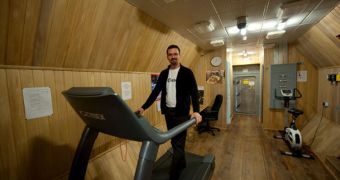Today, June 3, six mock astronauts entered a series of chambers at the Institute for Biomedical Problems (IBMP), in Moscow, Russia. The doors were closed behind them, and lying ahead are 520 days of complete isolation from the outside world. The crew will only be in contact with “Mission Control,” which will relay instructions as part of the monumental Mars 500 experiment. During their stay inside these mock Mars-bound modules, the six men will conduct science, and will have to endure all the rigors associated with a round-trip to the Red Planet. The facilities are also equipped with a room that mimics the surface of the planet in great detail, where the astronauts will spend an entire month, Space reports.
“The internationalism of Mars500 does not only involve the crew, but also the researchers who come from so many countries that I could easily surpass the word limit in this blog post. This is for sure a strong point of Mars500, as no human flight to the Red Planet will be possible by one single nation,” writes in a blog post Diego Urbina, an Italian engineer who participates on behalf of the European Space Agency (ESA). Joining him are fellow participants Romain Charles, a French engineer, Wang Yue from China, Russian engineers Mikhail Sidelnikov and Alexei Sitev, as well as surgeon Sukhrob Kamolov, also from Russia. The spare member is Russian general practitioner Alexander Smolevsky.
Oddly enough, at this point, technology is sufficiently developed to allow for us to ponder a mission to Mars. Radiation can be averted and spacecrafts isolated to prevent contamination. But what researchers can't yet account for is human nature. There is no telling how remaining isolated from all one knows would affect his or her intellect, cognitive abilities and mental health, experts say. It's precisely the role of the Mars500 experiment to figure this out.
The $15 million trials were appealing to more than 6,000 applicants in 40 countries, who wanted to join in on the action. The Deputy Head of the Mars500 project, Mark Belakovsky, told Russian journalists that all of those who applied were perfectly aware that scientists would have studied their every move, and analyzed the psychological and physiological effects that being secluded from those dear to them triggered on them. The six “astronauts” that made it into the final cut, plus one replacement crew member, will receive about $99,000 each at the end of the study.
“Mars is the ultimate goal of the global human exploration program. In addition to developing the necessary space infrastructure for exploration missions, ESA’s Directorate of Human Spaceflight also has an ongoing program of ground-based analogues and ISS research activities to make sure that our astronauts are as prepared as possible in the future for the physical and mental demands of long-duration exploration missions, and to develop countermeasures against any adverse effects of such a mission. Mars500 isolation study is a major milestone in this. The cooperation between ESA and Russia in this experiment is also an asset,” the ESA Director of Human Spaceflight, Simonetta Di Pippo, told reporters a couple of months ago.

 14 DAY TRIAL //
14 DAY TRIAL //